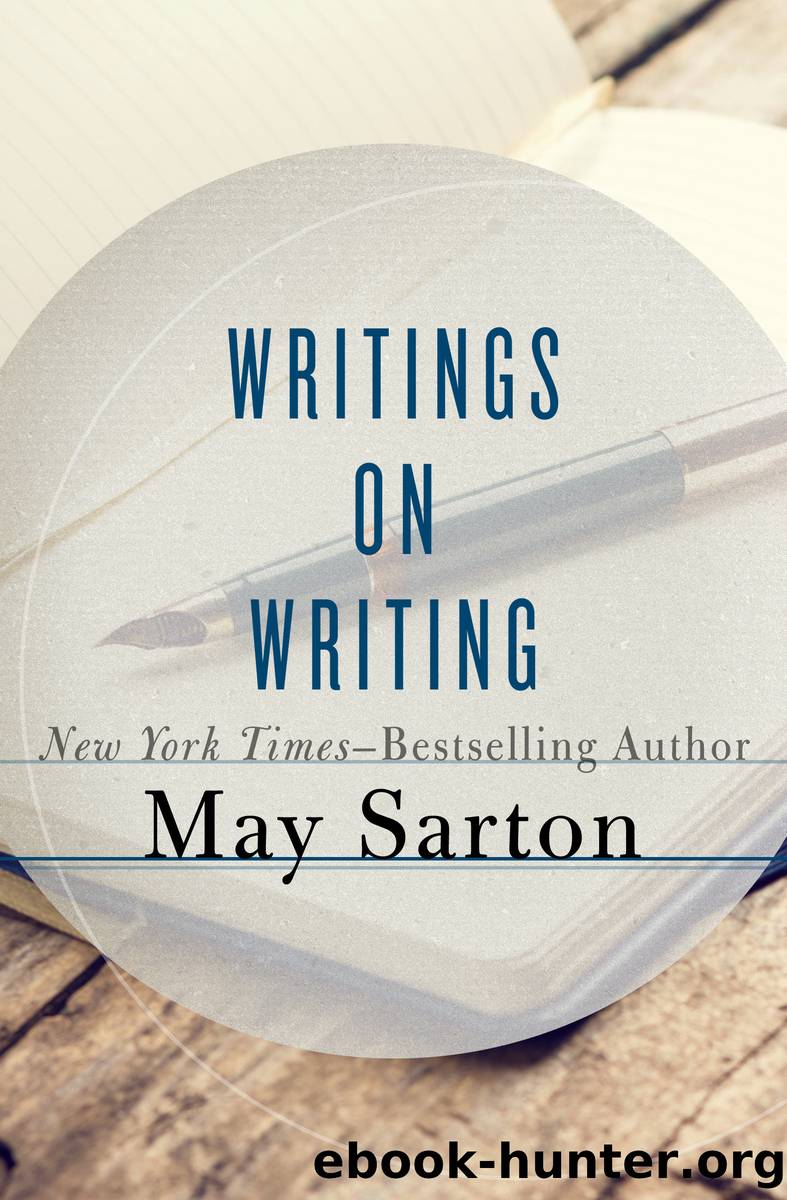Writings on Writing by May Sarton

Author:May Sarton
Language: eng
Format: epub
ISBN: 9781504017916
Publisher: Open Road Media
The Writing of a Poem
Several decades ago Charles Abbott at the University library in Buffalo began asking poets for their work sheets and built up an extraordinary collection. Since then other libraries have followed suit and it is now possible for students in many parts of the country to explore a poetâs mind at work, and to follow to its source what Marianne Moore has named âthe feeling and precision, the humility, concentration and gustoâ that must go into the writing of a poem.
But there is one thing that the work sheets on a single poem cannot show, and I must begin by speaking of it. I mean simply the state of being that precedes any writing. One might go so far as to say that the formal aspect of a poem, the craft aspect, is a game. The manipulation of certain words to make certain effects is a game not unlike a crossword puzzle or any other intellectual game with counters of one kind or another. What the work sheets show is the playing out of the game. What they cannot show is that, although poetry is a game, it is also a holy game; here, of course, it differs radically from the crossword puzzle. It is something more and something other than a purely intellectual amusement. In what does the âholinessâ of the game of poetry consist? Is it not in the quality of the experience that precedes the writing? For the writing of poetry is first of all a way of life, and only secondarily a means of expression. It is a life discipline one might almost say, a discipline maintained in order to perfect the instrument of experiencingâthe poet himselfâso that he may learn to keep himself perfectly open and transparent, so that he may meet everything that comes his way with an innocent eye. How is he to achieve this extreme awareness and maintain it? Do you remember Thoreau saying, âTo be awake is to be alive. I have never yet met a man who was quite awake. How could I have looked him in the face?â
No one could be asked to be âquite awakeâ all the time, but it is what the poet must ask himself more of the time than most people ask it of themselves. He must learn to induce a state of awareness. I use the word âinduceâ here quite deliberately. The mystic induces a state of extreme awareness, the visionary state, by certain disciplines, fasting, prayer, and so on. The poet must create his own disciplines. I myself have found that a good deal more solitude and a good many more empty hours than are usual in our âbusyâ civilization are one of my own requirements. I have to induce the state of awareness by renouncing some pleasures, the pleasures of society for instance. When I am writing I cannot afford to be out late at night. If I do go to a dinner party, I know that the next morning the edge will be a fraction less sharp, the edge of awareness.
Download
This site does not store any files on its server. We only index and link to content provided by other sites. Please contact the content providers to delete copyright contents if any and email us, we'll remove relevant links or contents immediately.
| Diaries & Journals | Essays |
| Letters | Speeches |
The Rules Do Not Apply by Ariel Levy(4945)
Bluets by Maggie Nelson(4536)
Too Much and Not the Mood by Durga Chew-Bose(4324)
Pre-Suasion: A Revolutionary Way to Influence and Persuade by Robert Cialdini(4198)
The Motorcycle Diaries by Ernesto Che Guevara(4078)
Walking by Henry David Thoreau(3941)
Schaum's Quick Guide to Writing Great Short Stories by Margaret Lucke(3367)
What If This Were Enough? by Heather Havrilesky(3298)
The Daily Stoic by Holiday Ryan & Hanselman Stephen(3287)
The Day I Stopped Drinking Milk by Sudha Murty(3183)
The Social Psychology of Inequality by Unknown(3011)
Why I Write by George Orwell(2937)
Letters From a Stoic by Seneca(2779)
A Short History of Nearly Everything by Bryson Bill(2678)
A Burst of Light by Audre Lorde(2585)
Insomniac City by Bill Hayes(2535)
Feel Free by Zadie Smith(2469)
Upstream by Mary Oliver(2381)
Miami by Joan Didion(2357)
